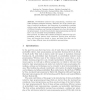Free Online Productivity Tools
i2Speak
i2Symbol
i2OCR
iTex2Img
iWeb2Print
iWeb2Shot
i2Type
iPdf2Split
iPdf2Merge
i2Bopomofo
i2Arabic
i2Style
i2Image
i2PDF
iLatex2Rtf
Sci2ools
130
click to vote
ALT
2004
Springer
2004
Springer
Probabilistic Inductive Logic Programming
Probabilistic inductive logic programming, sometimes also called statistical relational learning, addresses one of the central questions of artificial intelligence: the integration of probabilistic reasoning with first order logic representations and machine learning. A rich variety of different formalisms and learning techniques have been developed. In the present paper, we start from inductive logic programming and sketch how it can be extended with probabilistic methods. More precisely, we outline three classical settings for inductive logic programming, namely learning from entailment, learning from interpretations, and learning from proofs or traces, and show how they can be used to learn different types of probabilistic representations.
ALT 2004 | Inductive Logic Programming | Machine Learning | Probabilistic Inductive Logic | Statistical Relational Learning |
Related Content
| Added | 15 Mar 2010 |
| Updated | 15 Mar 2010 |
| Type | Conference |
| Year | 2004 |
| Where | ALT |
| Authors | Luc De Raedt, Kristian Kersting |
Comments (0)

